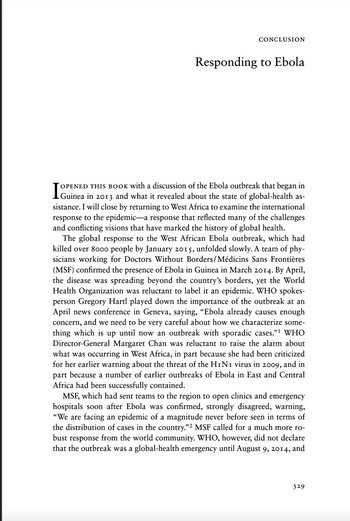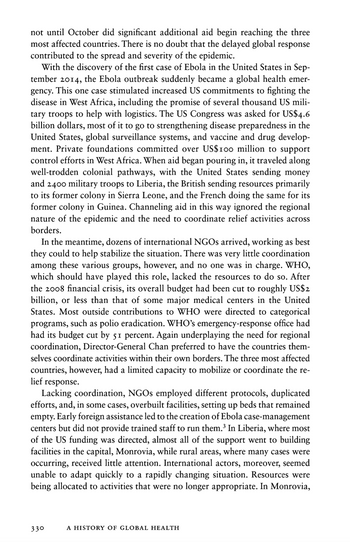Question
Discuss some of these challenges and conflicting visions. In what ways was the Ebola epidemic a product of global health’s history, i.e. the failure to address the underlying conditions that generated the epidemic?

Transcribed Image Text:CONCLUSION
Responding to Ebola
OPENED THIS BOOK with a discussion of the Ebola outbreak that began in
sistance. I will close by returning to West Africa to examine the international
response to the epidemic-a response that reflected many of the challenges
and conflicting visions that have marked the history of global health.
The global response to the West African Ebola outbreak, which had
killed over 8000 people by January 2015, unfolded slowly. A team of phy-
sicians working for Doctors Without Borders/Médicins Sans Frontières
(MSF) confirmed the presence of Ebola in Guinea in March 2014. By April,
the disease was spreading beyond the country's borders, yet the World
Health Organization was reluctant to label it an epidemic. WHO spokes-
person Gregory Hartl played down the importance of the outbreak at an
April news conference in Geneva, saying, “Ebola already causes enough
and we need to be very careful about how we characterize some-
thing which
up until now an outbreak with sporadic cases."¹ WHO
Director-General Margaret Chan was reluctant to the alarm about
what was occurring in West Africa, in part because she had been criticized
for her earlier warning about the threat of the H1N1 virus in 2009, and in
part because a number of earlier outbreaks of Ebola in East and Central
Africa had been successfully contained.
concern,
MSF, which had sent teams to the region to open clinics and emergency
hospitals soon after Ebola was confirmed, strongly disagreed, warning,
"We are facing an epidemic of a magnitude never before seen in terms of
the distribution of cases in the country."2 MSF called for a much more ro-
bust response from the world community. WHO, however, did not declare
that the outbreak was a global-health emergency until August 9, 2014, and
329

Transcribed Image Text:not until October did significant additional aid begin reaching the three
most affected countries. There is no doubt that the delayed global response
contributed to the spread and severity of the epidemic.
With the discovery of the first case of Ebola in the United States in Sep-
tember 2014, the Ebola outbreak suddenly became a global health emer-
gency. This one case stimulated increased US commitments to fighting the
disease in West Africa, including the promise of several thousand US mili-
tary troops to help with logistics. The US Congress was asked for US$4.6
billion dollars, most of it to go to strengthening disease preparedness in the
United States, global surveillance systems, and vaccine and drug develop-
ment. Private foundations committed over US$100 million to support
control efforts in West Africa. When aid began pouring in, it traveled along
well-trodden colonial pathways, with the United States sending money
and 2400 military troops to Liberia, the British sending resources primarily
to its former colony in Sierra Leone, and the French doing the same for its
former colony in Guinea. Channeling aid in this way ignored the regional
nature of the epidemic and the need to coordinate relief activities across
borders.
In the meantime, dozens of international NGOs arrived, working as best
they could to help stabilize the situation. There was very little coordination
among these various groups, however, and no one was in charge. WHO,
which should have played this role, lacked the resources to do so. After
the 2008 financial crisis, its overall budget had been cut to roughly US$2
billion, or less than that of some major medical centers in the United
States. Most outside contributions to WHO were directed to categorical
programs, such as polio eradication. WHO's emergency-response office had
had its budget cut by 51 percent. Again underplaying the need for regional
coordination, Director-General Chan preferred to have the countries them-
selves coordinate activities within their own borders. The three most affected
countries, however, had a limited capacity to mobilize or coordinate the re-
lief response.
Lacking coordination, NGOs employed different protocols, duplicated
efforts, and, in some cases, overbuilt facilities, setting up beds that remained
empty. Early foreign assistance led to the creation of Ebola case-management
centers but did not provide trained staff to run them.³ In Liberia, where most
of the US funding was directed, almost all of the support went to building
facilities in the capital, Monrovia, while rural areas, where many cases were
occurring, received little attention. International actors, moreover, seemed
unable to adapt quickly to a rapidly changing situation. Resources were
being allocated to activities that were no longer appropriate. In Monrovia,
330
A HISTORY OF GLOBAL HEALTH
Expert Solution
arrow_forward
Introduction
Between 2013 and 2016, the Ebola epidemic hit West African regions, resulting in several thousand' deaths and disrupting the socioeconomic setup of the west African region. One of the worst hit countries by the Ebola virus was Liberia, followed by Sierra Leone and Guinea. The first case of the disease was registered in 2013 in Guinea.
Step by stepSolved in 2 steps
